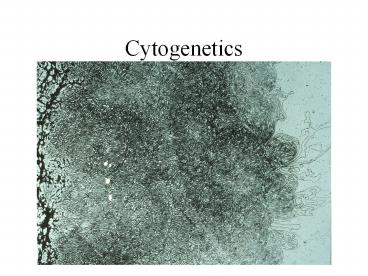Cytogenetics - PowerPoint PPT Presentation
Title:
Cytogenetics
Description:
Cytogenetics Chromosomal Disorders 50% of 1st trimester miscarriages 5% of stillbirths 0.5% of liveborns Down syndrome trisomy 21 Fragile X syndrome Somatic cell ... – PowerPoint PPT presentation
Number of Views:1688
Avg rating:3.0/5.0
Title: Cytogenetics
1
Cytogenetics
2
(No Transcript)
3
Chromosomal Disorders
- 50 of 1st trimester miscarriages
- 5 of stillbirths
- 0.5 of liveborns
- Down syndrometrisomy 21
- Fragile X syndrome
- Somatic cell abnormalities in cancers
4
History
- Bateson (1916) It is inconceivable that
particles of chromatin.can posses the powers
which must be assigned to our factors(genes). - (1955) Human cells were thought to have 48
chromosomes
5
Cytogenetic Technology
- Peripheral blood lymphocyte culture
- Phytohemagglutinin
- Hypotonic swelling
- Banding---Giemsa
- 350 550 bands/N (haploid set)
- 850 in prometaphase
- G-bands (dark) AT-rich, fewer transcribed genes,
LINES - R-bands (light) GC-rich, more transcribed genes,
SINES (Alu)
6
Metaphase spread
7
Prometaphase spread
8
Banding nomenclature
9
Chromosome morphology
10
Ideogram of human chromosomes
11
Human karyotype
12
(No Transcript)
13
Fluorescence in situ hybridizationFISH
14
Locus-specific probes
Ch 15 centromere (green) Ch 15 PWS critical
region (red)
15
Centromeric probes
Trisomy 9 (leukemia)
16
Centromeric probes
(Ch 13 red, Ch18 pink, Ch 21 green, X yellow, Y
white)
17
Centromeric probes
(Ch 8 red, Y yellow)
18
Chromosome painting probes
19
Chromosome painting probes
(Ch 9 green, der Ch 10)
20
Chromosome painting probes
21
(No Transcript)
22
Comparative Genomic Hybridization (CGH)
23
Chromosome Abnormalities
- Numerical
- Euploid---multiple of haploid number (N)
- Aneuploid---trisomy or monosomy
- Structural
24
Nondisjunction
25
Meiotic Nondisjunction
- Usually maternal (maternal age effect)
- Usually MI (meiosis I)
- Starts at 20 weeks fetal
- Arrests for 10 to 45 years
- Finishes MI at ovulation
- Meiosis II at fertilization
26
Meiotic nondisjunction
27
Structural abnormalities
28
Translocations
- Reciprocal
- Robertsonian (Centric fusion)
- Involves acrocentric chromomosomes
- Balanced or unbalanced
29
(No Transcript)
30
Whole-chromosome painting probes Ch 10 (red) and
17 (green) Arrows translocation chromosomes
Centromeric probes Ch 10 (green) and 17
(red) Arrows derivative chromosomes
Locus-specific probes Ch 15 centromere(green) Ch
15 PW/AS critical region (red) Arrow unbalanced
translocation
31
(No Transcript)
32
(No Transcript)
33
(No Transcript)
34
(No Transcript)
35
Trisomy 21 Down syndrome
36
46,XY, del(3)(q29)
Infant boy with severe anemia, neutropenia,
dysmorphic features, growth retardation and
developmental delay
37
Green 3pter probe Red 3q29 probe
38
(No Transcript)
39
(No Transcript)
40
(No Transcript)
41
Microdeletion Syndromes
- Williams-Beuren Syndrome (WBS)
- 1/20,000 all populations
- Phenotype
- Dysmorphic facies
- Growth and mental retardation
- Distinctive personality
- Transient hypercalcemia
- Arterial disease
- uniform 1.5 MB deletion del(7)q11.23
- Region flanked by duplicated genes---non-homologou
s recombination - 17 genes including ELN, which encodes
tropoelastin (point mutation causes AD
supravalvular aortic stenosis)
42
Williams syndrome
43
(No Transcript)
44
FISH Diagnosis Del(7)q11.23
45
Prader-Willi syndrome (PWS)
- 1/10,000
- Phenotype
- Mild to moderate MR
- Hypotonia, poor feeding in infancy
- Short stature, small hands and feet, small
external genitalia - Hyperphagia (compulsive overeating), obesity
46
Prader-Willi syndrome (PWS)
47
Prader-Willi syndrome (PWS)
48
PWS del(15)q11-q13
49
Prader-Willi syndrome (PWS)
- 1/10,000
- Phenotype
- Mild to moderate MR
- Hypotonia, poor feeding in infancy
- Short stature, small hands and feet, small
external genitalia - Hyperphagia (compulsive overeating), obesity
- Del(15)q11-13..Paternal
- Uniparental Disomy
50
Angelman syndrome
- Severe MR, absence of speech
- Jerky movements
- Inappropriate laughter
- Large jaw
- Del(15)q11-13----but Maternal
51
(No Transcript)
52
Genomic Imprinting
- Maternal and Paternal genetic contributions not
equivalent - Genetic contributions from both parents are
needed for normal development
53
Evidence for Imprinting
- Mouse Embryos
- Gynogenetic---poorly developed extra-embryonic
membranes - Androgeneticabnormal embryonic structures
- Human tumors
- Hydatidiform molesplacental tumors with two
paternal haploid sets of chromosomes - Ovarian teratomas---benign differentiated tumors
with two maternal haploid sets
54
Mechanism of Imprinting
- Some genes are preferentially inactivated
(imprinted) during gametogenesis in male and
female parents - Differential DNA methylation/histone acetylation
- Deletion of the active allele----functional
nullisomy - Uniparental disomy for the inactive
allelefunctional nullisomy
55
(No Transcript)
56
PWS/AS region































